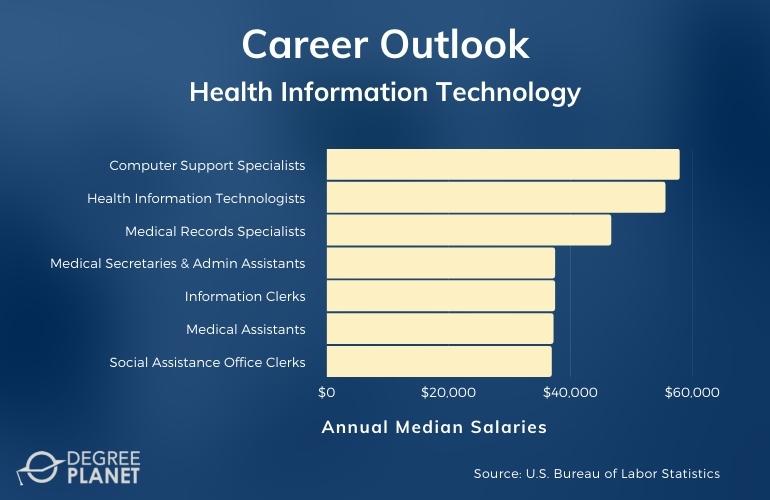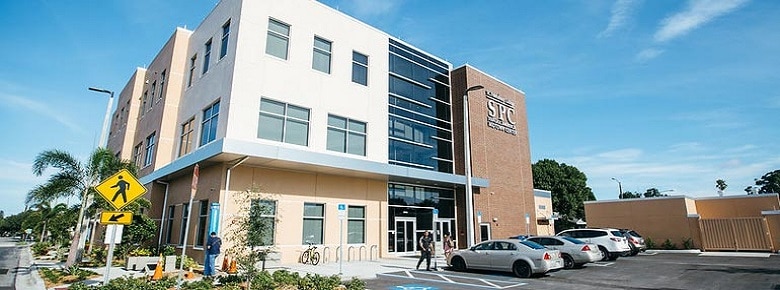Graduating with an associate degree in health information technology is a strategic opportunity for you to take on an essential, behind-the-scenes role in the field of healthcare.

With a career in health information technology, you can contribute to patients’ lives by developing, using, and maintaining systems for managing data. Health information technologists are responsible for analyzing information to improve patient care and ensure confidentiality.
Editorial Listing ShortCode:
If you’re interested in becoming a healthcare professional and working in a clinic, hospital, or long-term care facility, completing a health information technology associate degree online may be a beneficial first step.
Online Associate Degrees in Health Information Technology

Students pursuing online health information technology degrees learn about the proper methods for documenting patient care, compiling data, and securely maintaining files. With the expanded use of electronic health records, these are important jobs within the field.
If you have an interest in working in healthcare as well as with computer systems and data, you may be well suited to a career in health information technology. Most employees in these jobs excel in organizing information, communicating clearly, and understanding medical regulations.
Editorial Listing ShortCode:
A career in health information technology can involve a number of essential tasks in a healthcare facility. Some common responsibilities include:
- Helping evaluate and implement electronic healthcare systems
- Gathering data and generating reports
- Maintaining privacy and security of patient records
- Organizing information in databases and registries
- Tracking patient outcomes
- Documenting patient care and treatments
Earning an associate degree can be a strategic step toward finding a role in this growing area of employment. Similar to those in a health information management degree online program, students pursuing health information technology degrees online may study subjects such as:
- Medical terminology
- Coding
- Laws and ethics in healthcare
- Medical reimbursement
- Databases
- Health services information systems
- Health insurance
Knowledge of these topics may help you qualify for a career in health information technology as an assistant, medical registrar, or medical records specialist.
These kinds of positions are fitting for people who want to work in the medical field but are not interested in studying to become a doctor or nurse. For instance, health information technologists can operate behind the scenes to significantly improve patient care.
Completing an associate degree in health information technology may also offer the necessary academic background to enroll in a related bachelor’s degree program.
Health Information Technology Careers & Salaries

Records and documentation are a vital component of all healthcare systems. An associate degree in health information technology may be an asset when applying for jobs in different environments, including clinics, hospitals, laboratories, and rehabilitation centers.
According to the Bureau of Labor Statistics, here are the median salaries of some common roles associated with health information technology.
| Careers | Annual Median Salaries |
| Computer Support Specialists | $57,910 |
| Health Information Technologists and Medical Registrars | $55,560 |
| Medical Records Specialists | $46,660 |
| Medical Secretaries and Administrative Assistants | $37,450 |
| Information Clerks | $37,450 |
| Medical Assistants | $37,190 |
| Healthcare and Social Assistance Office Clerks | $36,900 |
| Pharmacy Technicians | $36,740 |
| Healthcare and Social Assistance Receptionists | $34,200 |
| Medical Transcriptionists | $30,100 |
Many of these positions, such as medical records specialists and medical secretaries and administrative assistants, are growing at an average rate.
Editorial Listing ShortCode:
The Bureau of Labor Statistics projects that employment for other roles will have growth that is much faster. For instance, health information techs and medical registrars are expected to see 17% job growth over the next ten years, and 16% growth is expected for medical assistants.
Health Information Technology Associate’s Curriculum & Courses

The curriculum of each individual health information technology program differs based on the school you attend, but most programs focus on the same core principles. These are some of the types of courses you are likely to encounter while pursuing your associate degree:
- Basic Medical Terminology: In this course, you’ll learn about the foundations of words that describe the human body and medical conditions, procedures, and treatments.
- Introduction to Health Services and Information Systems: This class focuses on the issues within and the history of the US healthcare system.
- Health Information Processes:In this course, you’ll learn how to use codes, calculations, tabulations, and audits to verify information.
- International Classification of Diseases Coding: In this class, you’ll explore the principles of the International Classification of Diseases system when coding diagnoses and procedures.
- Procedural Terminology Coding: The focus of this course is the current procedural terminology coding manual.
- Legal and Regulatory Issues in Health Information: In this class, you’ll discuss the laws and regulations related to healthcare and patient records.
- Data Applications and Healthcare Quality: The focus of this class is how data can be analyzed and used to improve patient care and outcomes.
- Health Insurance and Reimbursement: In this course, you’ll learn about methods of payment and reimbursement in healthcare settings.
- Pathopharmacology:In this class, you’ll explore the concepts and principles of pathophysiology and drug therapy.
- Human Anatomy and Physiology: In this course, you’ll learn about the structures and functions of the human body.
Some of these classes may include both lecture and lab components. Many health information technology programs also require you to complete a capstone project or practicum.
How to Choose an Online Health Information Technology Associate Degree Program

As you consider your options and select an associate in health information technology online degree program, it may be helpful to evaluate some specific factors, such as the following:
- Format. Some online programs are asynchronous, which means that you can complete the work on your own time, whereas others are synchronous and require virtual attendance at a specific time.
- Cost. It’s essential to keep your budget in mind as you compare programs, and you may also want to compare different schools’ financial aid offerings.
- Accreditation. Programs that have been CAHIIM accredited are up to industry standards and are likely to strengthen your candidacy for a job.
- Support services. Some online schools have services available for students that are similar to on-campus offerings, such as tutoring, career counseling, advising, and accessibility centers.
- Program length. You may have a specific deadline by which you want to complete your studies, so it’s helpful to consider the number of credit hours a program requires and how long it will take you to complete them.
- Enrollment status. Some programs are very accommodating for part-time students, while others prefer that you attend full-time.
Your academic goals are highly personal and specific, so it’s helpful to reflect on your plans, priorities, and needs in order to make the decision that’s best for you.
Admissions Requirements

There is no universal set of requirements for admission to a health information technology associate program, but these are some of the most common criteria:
- Test scores. You may be required to submit SAT or ACT scores, but this is less common for associate degree programs.
- Transcripts. You’ll provide official high school transcripts or evidence that you received your GED.
- Personal essay. Some schools require you to explain your interest in their program.
- Letters of recommendation. Instructors or supervisors can describe your strengths and abilities through reference letters.
Many programs also require you to complete an official application and pay a fee.
Accreditation

To receive regional accreditation, colleges and universities must undergo a stringent evaluation to determine if they meet the standards of a regional accrediting body. Schools with accreditation must periodically apply for renewal to ensure that their educational offerings remain high-quality and up to date.
Editorial Listing ShortCode:
While there are different forms of accreditation, regional accreditation is particularly significant. Regionally accredited schools are generally held to higher standards, and courses are often easier to transfer to other colleges and universities.
CAHIIM Accreditation
In addition to a school receiving regional accreditation, health information technology programs can also be accredited by the Commission on Accreditation for Health Informatics and Information Management Education (CAHIIM).
The CAHIIM assesses degree programs for academic quality and conducts annual program monitoring. Programs that apply must meet a very high set of standards in order to be granted accreditation. Attending a CAHIIM accredited program may help you become better qualified for your future career.
Financial Aid and Scholarships

Although associate degree programs are generally less expensive than bachelor’s degrees, they can still require a substantial financial investment. There may be opportunities available to help reduce the cost of your education.
For instance, you can submit the FAFSA to apply for federal aid, and your state may also offer assistance with tuition. If you are currently employed in the field, you might consider speaking to your employer about the possibility of tuition assistance or reimbursement.
You may also be able to research and locate scholarship opportunities for your field or for your specific circumstances. Scholarship programs may be offered by your school or outside organizations.
Health Information Technology Professional Organizations

Joining a professional organization can provide opportunities to network, learn, and find job listings. Here are some health information technology professional organizations:
- American Academy of Professional Coders (AAPC): The AAPC has members who work in coding, billing, auditing, compliance, and documentation, and it offers access to network events and webinars.
- American Health Information Management Association (AHIMA): Members of AHIMA have access to a network of health information professionals, career guidance, and development opportunities.
- Healthcare Information and Management Systems Society (HIMSS): As a member of the HIMSS, you can participate in training, conferences, and committees.
Membership in a professional organization may improve your professional development and your potential job prospects.
What Is a Health Information Technology Degree?

A health information technology (HIT) degree is a program that focuses on how healthcare professionals manage, gather, and use patient data. You can learn how to properly handle sensitive information, store it securely, and use it to improve patient outcomes.
Editorial Listing ShortCode:
Students who pursue a health information technology online associates degree can develop skills in research, coding, medical terminology, and compliance. Some programs are also designed to help you prepare to take the Registered Health Information Technician certification exam.
What Can I Do with an Associates Degree in Health Information Technology?

An associate degree program in health information technology can help prepare you for a number of career paths. Graduates often go on to become health information technologists, medical records specialists, or coders. These are integral roles in healthcare facilities, including hospitals and private practices.
An associate degree in health information technology can help prepare you to immediately enter the workplace. Careers in health information technology can allow you to have a direct role in improving patient care.
How Long Does It Take to Get an Associates in Health Information Technology Degree Online?

The average health information associate degree program requires between 60 and 74 credit hours and can typically be completed in 2 years. Certain factors can extend or shorten this time.
If you are a full-time student in a traditional, 16 week semester program, you can often graduate in 2 years. Some schools offer a condensed program that you can complete more quickly. If you plan to attend part-time, it may take longer for you to graduate.
What’s the Difference Between an Associate’s Degree in Health Information Technology vs. Health Information Management?
Health information technology and health information management are closely related, but there are important differences between them.
| Health Information Technology | Health Information Management |
|
|
The tasks of health information technology and health information management professionals are both important to the functioning of healthcare systems. While an associate degree can help you begin working in the field of health information technology, a bachelors may be required for more positions related to information management.
What’s the Difference Between a Health Informatics vs. Health Information Technology Associate’s Degree?
Health informatics and health information technology both involve the use of data, but their approach to the data differs.
| Health Information Technology | Health Informatics |
|
|
Health information technology and health informatics programs can both lead to rewarding careers in healthcare.
Is an Online Degree in Health Information Technology Worth It?

Yes, an online degree in health information technology is worth it for many professionals. Jobs in healthcare tend to be in high demand. The Bureau of Labor Statistics projects average or faster than average growth for careers related to health information technology.
For instance, health information technologists and medical registrars are expected to see 17% job growth over the next ten years (Bureau of Labor Statistics). An online health information technology degree may be beneficial if you have an interest in both healthcare and computer systems.
Editorial Listing ShortCode:
With the necessity of electronic medical records, health information technologists have played an important role in building, maintaining, and using new systems.
Universities Offering Online Associates in Health Information Technology Degree Programs
Methodology: The following school list is in alphabetical order. To be included, a college or university must be regionally accredited and offer degree programs online or in a hybrid format.

Alfred State College offers an Associate of Applied Science in Health Information Technology.
The program is designed for students pursuing technological and administrative roles at medical facilities, insurance companies, governmental agencies, law firms, or software companies. On average, full-time students can complete the program in 4 semesters. All classes meet online.
Alfred State is accredited by the Middle States Commission on Higher Education.

Clarkson College offers an Associate of Science in Health Information Technology. The program’s interdisciplinary curriculum combines fundamental principles from health science, management, and information technology studies. Students can complete the program’s 64 required credit hours fully online. New students are admitted year-round, and they can typically complete the program in 6 semesters.
Clarkson College is accredited by the Higher Learning Commission.

Columbus State Community College offers an Associate of Applied Science in Health Information Management. The program aims to help students develop the skills needed to maintain systems that manage medical, legal, ethical, and regulatory standards. Students can attend their classes in a convenient online format. The program’s 66 required credits can usually be finished in 5 semesters of full-time study.
Columbus State Community College is accredited by the Higher Learning Commission.

Davidson-Davie Community College offers an Associate of Applied Science in Health Information Technology. Courses cover topics like coding systems, cybersecurity, data analytics, health informatics, and organizational leadership. The program requires the completion of 67 credit hours. In addition to course requirements, students must complete clinical practicum requirements where they can gain hands-on experience.
Davidson-Davie Community College is accredited by the Southern Association of Colleges and Schools Commission on Colleges.

DeVry University offers an Associate in Health Information Technology. This program is centered on the importance of acquiring, storing, and reporting data to promote excellent patient care. Classes are housed entirely online and start every 8 weeks for incoming students. The curriculum is designed to prepare graduates for certification as registered health information technicians.
DeVry University is accredited by the Higher Learning Commission.

Harper College offers an Associate of Applied Science in Health Information Technology. Graduates often pursue careers as medical records technicians, health informatics analysts, or health information technicians. The program utilizes a fully online learning model. Most students can complete the 60 required credit hours in just 2 years.
Harper College is accredited by the Higher Learning Commission.

Northwood Technical College offers an Associate in Health Information Technology. This program may be an excellent next step for students pursuing administrative and technology roles in healthcare. On average, students can finish this 62 credit curriculum in 2 years. Potential classes include Digital Literacy for Healthcare, Health Quality Management, Intermediate Coding, and Healthcare Law and Ethics.
Northwood Tech is accredited by the Higher Learning Commission.

Ozarks Technical Community College offers an Associate of Applied Science in Health Information Technology. The program aims to provide students with the skills to protect patient privacy, improve outcomes, and promote organizational excellence. This 66 credit program can typically be completed in 2.9 years. Graduates often pursue positions in settings like hospitals, clinics, insurance companies, and nursing homes.
OTC is accredited by the Higher Learning Commission.

Rasmussen University offers an Associate for Health Information Technicians. The curriculum covers topics like healthcare technologies, data management, revenue cycles, and information privacy policies. This program can be completed 100% online. Students may be able to gain credit for qualifying academic and professional experiences that apply to their discipline.
Rasmussen University is accredited by the Higher Learning Commission.

Rowan College at Burlington County offers an Associate of Applied Science in Health Information Technology. The curriculum is designed to teach students how to collect and analyze data that healthcare providers use to deliver quality healthcare. Students can complete the program’s 64 required credits entirely online. The program considers applications for incoming students year-round.
Rowan College at Burlington County is accredited by the Middle States Commission on Higher Education.

Seminole State College of Florida offers an Associate of Science in Health Information Technology. Graduates often pursue support roles in settings like long-term care organizations, insurance companies, hospitals, and private practices. The majority of this program’s courses can be completed fully online or in a hybrid format. The program requires the completion of 70 credit hours.
Seminole State College is accredited by the Southern Association of Colleges and Schools Commission on Colleges.

St. Petersburg College offers an Associate of Science in Health Information Technology. The program aims to help students develop the technical and leadership expertise needed to support diverse healthcare goals.
Courses cover concepts like medical terminology, coding, healthcare systems, and project management. The curriculum seeks to prepare students for obtaining information technician or coding assistant certifications after graduation.
SPC is accredited by the Southern Association of Colleges and Schools Commission on Colleges.

The University of Alaska—Southeast offers an Associate of Applied Science in Health Information Management. This program is intended for students pursuing certification as registered health information technicians. Students must complete a minimum of 62 credits hours while maintaining a GPA of 2.0 or higher to graduate. Most classes are offered in a convenient online learning format.
UAS is accredited by the Northwest Commission on Colleges and Universities.

The University of Cincinnati offers an Associate of Applied Science in Health Information Systems. Graduates of the program often pursue careers as health services managers, patient information coordinators, medical records directors, or health information consultants.
Students can complete the degree 100% online. Topics of study include health services billing and coding, electronic health records, data management, and healthcare administration and leadership.
The University of Cincinnati is accredited by the Higher Learning Commission.

Weber State University offers an Associate of Applied Science in Health Information Technology. Students interested in serving as leaders and administrators in healthcare may find an excellent fit in this program. Students can complete the degree online, in-person, or utilizing a hybrid learning model. Potential classes include Computer Literacy, Pathophysiology, and Epidemiology and Biostatistics.
Weber State University is accredited by the Northwest Commission on Colleges and Universities.
Getting Your Associate Degree in Health Information Technology Online

If you want to better the lives of patients and enjoy analyzing data, the field of health information technology may be a good fit for you. A healthcare informatics degree online combines healthcare and information technology and management.
An associate degree in health information technology may also be appealing if you want to enter the workforce more quickly. Your degree could help you qualify for positions with a wide range of employers.
If this seems like the right path for you, you can begin by researching accredited schools that offer online associate degrees in this field.

